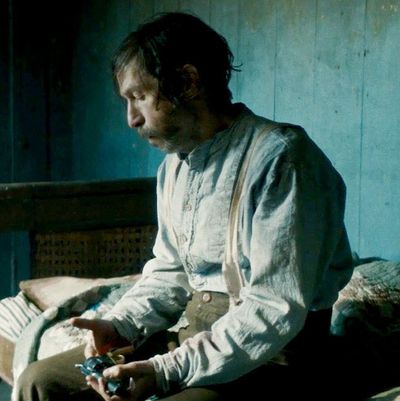
Early on in the new Western Old Henry, Tim Blake Nelson’s Henry McCarty, a stoic Oklahoma rancher who has just brought home a nearly dead man he found bleeding out in the hills, walks up to his horse and opens up a saddlebag. Out of it he takes a satchel that he found alongside the wounded man. He looks inside the satchel, which he already knows is filled with cash, before scanning the empty horizon as it settles into dusk. We don’t see any close-ups of Henry — just the camera observing him from afar, and even pulling back a little, to emphasize his solitude.
It’s a nauseatingly evocative moment, both because of the way director Potsy Ponciroli’s camera isolates the actor, and because Tim Blake Nelson conveys, through his defeated posture and anxious movements, the stone that is slowly forming in his stomach. Earlier, when he first came upon the money and the man, Henry had quietly ridden away from them, unwilling to get involved, only to change his mind. Now, again without a word of dialogue, he tells us that he knows that the valley below and the hills beyond will soon fill up with the shadows of other men looking for the cash.
In its broad strokes, Old Henry is a familiar siege tale. Henry and his son, Wyatt (Gavin Lewis), have taken in the barely alive Curry (Scott Haze), who claims he’s a sheriff who made away with the loot stolen by a group of bank robbers led by Ketchum (Stephen Dorff). Soon enough, Ketchum and his men arrive, as Henry, Wyatt, and Curry hole up inside the house, and unspeakable violence ensues, along with catnip-to-genre-fans lines like, “Long ago, there was a guy who caused some trouble down Arizona, New Mexico way.”
As a setup, it’s not much, but of course there’s more to it. The film establishes the tense relationship between Henry and the teenaged Wyatt early on, as the son bristles at the father’s refusal to let him be his own man. The overprotective Henry won’t even let his boy handle a gun or do any target practice, despite the fact that they live out in the middle of nowhere, where such skills might actually come in handy. But we also understand that Henry’s almost dictatorial control of Wyatt’s world comes from a deep well of experience, of buried brutality and very real fear; here’s a man clearly haunted by a past he does not speak of, some artifacts of which can be found in a trunk full of guns and newspaper clippings he keeps stashed away, others of which can be found in the ancient scars on his back. The relationship goes both ways, however. As Old Henry proceeds, it becomes not just a movie about a father learning to let go, but also about a son learning to do the same.
Blake Nelson, one of our finest actors, gives Henry’s mysterious inner life physical expression. He writes a whole novel with his lopsided glare alone: One eye is narrower than the other, which sometimes looks to us like an old scar and sometimes like a symbol of his constant wariness, and is probably a little of both. The unpredictable tension in his movements — uncanny stillness, followed by an agitated scurry — suggests a man who’s running from something but knows he can’t go anywhere. He’s bound himself to this land, perhaps because the rest of the world has become too poisoned for him. “Where’d you come from?” someone asks Henry late in the film. “Everywhere on Earth but this,” is his angry response.
Later in the film, after we find out more about who Henry once was — it’s a revelation, and an ecstatic one, but not exactly a twist, as we see it coming from miles away — it’s almost as if he’s been briefly liberated, allowed to become who he really is. It helps that Blake Nelson has Dorff opposite him as the leader of the men who ultimately become the vessels (and victims) of Henry’s transformation. It’s clear that Ketchum himself has seen a few things, and the way he watches Henry implies that he knows there’s more to the man than the diminutive, weathered rancher playing dumb before him.
So, the real drama happens between the lines, which, believe it or not, makes Old Henry a more traditional Western than most. And staying true to the genre, director Ponciroli shoots the surrounding prairie and hills as an emotional mirror: The expansiveness first seems to promise security and solitude but, as the story proceeds, all that land and sky becomes ominous, open and unprotected and ready to fill with manifold dangers at a moment’s notice. It’s a beautiful metaphor for the gathering storm and, paired with Tim Blake Nelson’s eerily memorable performance, lends lovely depth to this otherwise simple Western fable.
More Movie Reviews
- The Thriller Drop Is a Perfect Addition to the Bad-First-Date Canon
- The Accountant 2 Can Not Be Taken Seriously
- Another Simple Favor Is So Fun, Until It Gets So Dumb


